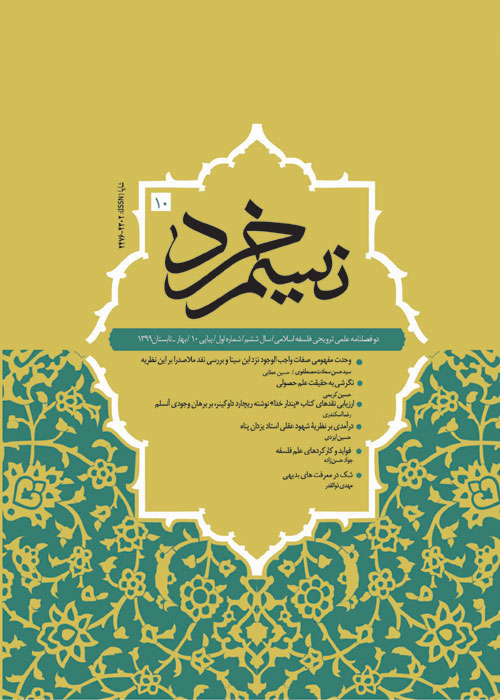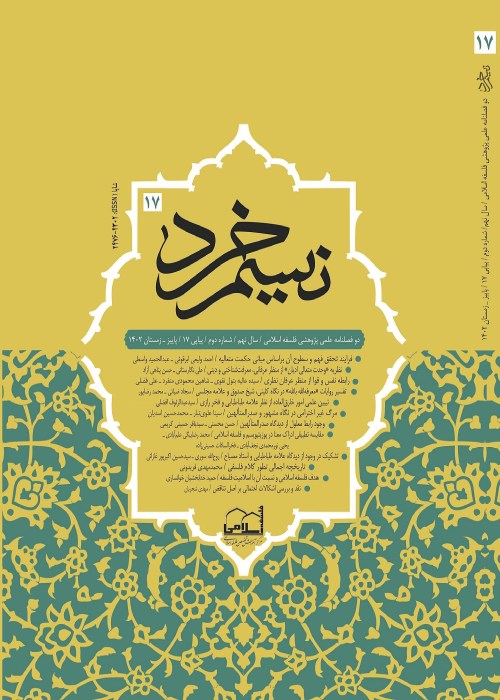فهرست مطالب

نشریه نسیم خرد
سال هفتم شماره 1 (پیاپی 12، بهار و تابستان 1400)
- تاریخ انتشار: 1401/04/04
- تعداد عناوین: 7
-
-
صفحات 7-8
-
صفحات 9-21
استفاده از عقل برای تبیین معارف الهی از دیرباز موردتوجه اندیشمندان قرار گرفته است، در قرآن کریم نیز بهره گیری از عقل مورد تاکید است در بسیاری از آیات قرآن کریم واژه های: تعقلون، تدبرون و غیره به کار رفته است که توجه به این قوه الهی را بیان می نماید. با توجه به اهمیت و جایگاه عقل در معارف اسلامی مقاله حاضر با جمع آوری اطلاعات کتابخانه ای به روش مقارن به بررسی عقل گرایی در قرآن از دیدگاه آرکون و علامه طباطبایی می پردازد. ثمره تحقیق این قلم آن است که آرکون معنا و مفهوم عقل در قرآن را برخلاف عقل برهانی و استدلالی مدنظر دارد و با دسته بندی عقل اسلامی به سه دوره: شکل گیری اندیشه اسلامی، کلاسیک اسلامی و دوران اسکولاستیک معتقد است؛ عقل اسلامی پیرو وحی بوده، واژه عقل در قرآن بیانگر عبارات احساس گونه و مجاز است که به هیچ وجه استدلال پذیر نیست. و در اعصار بعد از نزول قرآن کریم معارف الهی توسط رییسان مذاهب به نسل بعد به صورت منقول منتقل شده و خالی از استدلال است، اما علامه طباطبایی عقل قرآنی را به معنای مطابق فطرت بشر بودن تفسیر می کند.
کلیدواژگان: عقل، قرآن، فطرت، علامه طباطبایی، آرکون -
صفحات 23-39
مساله علم یکی از بنیادی ترین مباحث فلسفه است که بسیاری را به تامل درباره حقیقت و کیفیت آن واداشته است. مفهوم علم که به معنای مطلق دانش و آگاهی است، مفهومی بدیهی است، اما رویکرد حکماء اسلامی به حقیقت آن متفاوت است. بعضی آن را امری سلبی و بعضی آن را صورت منطبعه در عقل و برخی نیز آن را از مقوله اضافه دانسته اند. ملاصدرا نیز با توجه به مبانی خاص خود مانند اصالت وجود، حقیقت علم را امری وجودی و حضوری می داند و با این رویکرد علم را از سنخ وجود و خارج از مفاهیم ماهوی می داند. در این پژوهش ابتدا به بررسی و تحلیل چیستی علم از دیدگاه حکمای اسلامی پرداخته شده است و سپس با روش تحلیلی دیدگاه ملاصدرا درباره حقیقت علم مورد بررسی قرار گرفته است و در نهایت ثمرات وجودی مترتب بر آن را بررسی کرده است.
کلیدواژگان: هستی شناسی، علم، تجرد، حضور، حکمت متعالیه -
صفحات 41-62
مبنای «وحدت نفس و قوی » یا «النفس فی وحدتها کل القوی» یکی از اصلی ترین مبانی ملاصدرا در باب نفس شناسی فلسفی است ،به منظور فهم صحیح این مبنا و رسیدن به ثمرات وکارکردهای آن،باید تصویر خوبی از آن به دست آورد؛لذا با روش تحلیلی-توصیفی ابتدا به دیدگاه مشایین پرداختیم و با بررسی آن به این نتیجه رسیدیم که فقدان برخی مبانی لازم ،باعث تحلیل نادرست ایشان از رابطه نفس و قوی شده است.در تبیین دیدگاه ملاصدرا بین مقام ذات و فعل، همچنین بین نظر متوسط و نهایی ملاصدرا در باب تشکیک تفکیک کردیم و معلوم شد که رابطه نفس وقوی در نگاه ملاصدرا به حسب مقامات متعدد تفاسیر مختلفی دارد:مطابق با مقام ذات به «نفس و حقایق مندمجه آن» و طبق دیدگاه تشکیک خاصی به «نفس و مراتبش» و طبق تشکیک خاص الخاصی «نفس و شیوناتش» تفسیر می شود.
کلیدواژگان: وحدت نفس و قوی، مراتب نفس، شئون نفس، تشکیک، ابن سینا، ملاصدرا -
صفحات 63-83
بحث علم دینی یا اسلامی سازی علوم در جهان اسلام، یکی از مسایل مهم در عرصه علوم انسانی است که در چند دهه اخیر ذهن بسیاری از متفکران و فیلسوفان را در حوزه علم و دین به خود مشغول کرده است. پژوهش در مبانی و مبادی معرفت شناختی و روش شناختی دیدگاه های مطرح شده در حوزه علم دینی یکی از نیازهای اساسی متفکرین در عرصه علوم انسانی و اجتماعی است. بحران های ناشی از علم گرایی و افراط در نظریات تعارض علم و دین در دو قرن اخیر پرسش از همکاری علم و دین و به تبع آن امکان علم دینی و خدا باور را مورد تامل قرار داده است. نظریات مختلفی توسط اندیشمندان جهان اسلام طی دو قرن گذشته ارایه شده است و هریک از زاویه نگرش خود به اسلامی سازی علم پرداخته اند. دکتر فاروقی با تاکید بر میراث اسلامی گذشته و ضعف های نظام آموزشی سنتی و غرب، اسلامی سازی علوم را در گرو، اصلاح نظام آموزشی و ادغام دو سیستم سنتی اسلامی و جدید غربی با محوریت اسلام می داند. اهمیت دیدگاه دکتر فاروقی بر این است وی ضعف و کاستی های نظام آموزشی اسلامی را شناخته و نگاه آسیب شناسانه به علوم جدید داشته است
کلیدواژگان: فاروقی، اسلامی سازی علوم، نظام آموزشی سنتی، میراث اسلامی، تمدن غرب -
صفحات 85-98
حرکت در حکمت متعالیه به معنای تحقق وجود سیلانی و تجددی شیء می باشد. وجودی که کاملا منطبق بر زمان بوده و در هر آن مفروض مقطعی مفروض از آن محقق می شود و در کل زمان تمام آن وجود پدیدار می گردد. لذا حرکت نحوه ی وجود شیء قلمداد می شود و از زمره ی ماهیات خارج است و حرکت جوهری به معنای تحقق وجود سیال از مقوله جوهر خواهد بود. بر اساس نگرش حکمت متعالیه نسبت به چیستی حرکت و با پذیرش حرکت جوهری لوازم حرکت توصیفی بدیع پیدا می کنند. در این مقاله قصد داریم با روش تحلیلی توصیفی به تبیین لوازم حرکت در بستر حرکت جوهری و با توجه به نحوه وجود بودن حرکت بپردازیم.
کلیدواژگان: حرکت، حرکت جوهری، سیلان، وجود تجددی -
صفحات 99-120
تعالیم اسلامی در یک تقسیم رایج و مشهور به سه بخش عقاید، اخلاق و فقه تقسیم می گردد.در حوزه فقهی با یک سابقه تاریخی،کار علمی اجتهادی همواره مطرح و مورد توجه بوده است لکن در دو حوزه معارف اعتقادی و اخلاقی علی رغم اهمیت و تاثیر بسیار آنها بر هدایت،رشد،کمال و سعادت انسان و جامعه، اجتهاد و تلاش های علمی مجتهدانه، بسیار کمتر مورد توجه بوده و هست.این نوشتار پس از تعریف مفهوم و مقصود از اجتهاد در معارف اعتقادی، با بیان سه گونه ادله قرآنی،روایی و عقلی، به دنبال اثبات ضرورت کار اجتهادی و استنباطی عمیق در حوزه معارف اعتقادی می باشد و پس از ذکر ادله فراوان نقلی و عقلی، این نتیجه گرفته می شود که بسیار لازم و ضروری است که در معارف اعتقادی نیز تلاش اجتهادی و استنباطی دقیق و عمیق همانند اجتهاد در فقه به گونه شایسته و کافی انجام گیرد.
کلیدواژگان: اجتهاد در عقاید، اجتهاد در اعتقادات، معارف اعتقادی، اجتهاد عام، ثقفه عام، اجتهاد در دین، اجتهاد در کلام، اعتقادات
-
Pages 9-21
The use of intellect to explain the divine knowledge has long been considered by thinkers. In the Holy Qur'an, the use of intellect is emphasized. In many verses of the Holy Qur'an, the words: reason, contemplation, etc. have been used to express attention to this divine power. It seems. Considering the importance and position of reason in Islamic teachings, the present article collects library information in a contemporary way and examines rationalism in the Qur'an from the perspective of Arkon and Allameh Tabatabai. The result of this writer's research is that Arkon considers the meaning and concept of reason in the Qur'an as opposed to argumentative reason, and by categorizing Islamic reason into three periods: the formation of Islamic thought, Islamic classical and the scholastic period; Islamic reason follows revelation, the word reason in the Qur'an expresses emotional and permissible expressions that can not be argued in any way. And in the ages after the revelation of the Holy Quran, the divine knowledge was transmitted to the next generation by the heads of religions and is devoid of argument, but Allameh Tabatabai interprets the Quranic wisdom in the sense of being in accordance with human nature.
Keywords: Reason, Quran, Nature Allameh Tabatabai, Arkon -
Pages 23-39
The issue of science is one of the most fundamental issues of philosophy that has made many thinkers think about truth and its quality. The concept of science, which is the absolute meaning of knowledge and awareness, is an obvious concept, but the approach of Islamic scholars to its truth is different. Some have considered it a negative thing, some have considered it as a form in the intellect and some have considered it as an additional category. Mulla Sadra considers the truth of science as an existential thing and with this approach he excludes science from the scope of essential concepts.
-
Pages 63-83
The subject of religion knowledge or Islamization of the knowledge in the Islamic world has been one of the main issues in the humanities field that has involved the mind of many thinkers and scholars of knowledge and religion field. So , research is in the foundations and bases of epistemological and methodological of the viewpoints offered in the field of religious knowledge has been one of the main needs of visionaries in the field of epistemological and social. Generally , items such as crisis that come from new western culture and civilization , the importance of solving the Islamic noetic and thinking lag, limitation and shortcomings of new experimental science , the importance of doctrines of Islam and recovering of muslim`s scientific and heritage civilization and expansion of dimension of ideas of unity if religion and knowledge can be considered as a motivation of plan and expansion of Islamic thought as a general and Islamic knowledge more specifically. Beside deficiencies of new epistemology and cultural dichotomy in Islamic communities makes the necessity of producing knowledge for most important . In the field there have been offered different theories by different scholars in the last two decades in the Islamic world and each of them has considered from its own viewpoint for Islamization of knowledge that can name Dr. Esmaeel Faroughi. Dr. Faroughi has emphasized on Islamic heritage and shortcomings of traditional and western educational system and has conditioned the Islamization of the knowledge in correction of educational system and mergering tow Islamic and new western systems with the Islam as the axis. From other viewpoint ,
Keywords: or Islamization, of the knowledge, Dr Esmaeel Faroughi, Islamic -
Pages 85-98
Movement in transcendent wisdom means the realization of the fluid and modern existence of the object. Existence that is completely in accordance with time, and in each of them, the assumed cross-section is realized, and in the whole time, the whole existence appears. Therefore, motion is considered as the existence of an object and is out of the category of essences, and substantial motion means the realization of the existence of fluid from the category of substance. Based on the attitude of transcendent wisdom towards what motion is, and by accepting the essential motion, the devices of motion find a novel description. In this article, we intend to explain the means of motion in the context of substantial motion with a descriptive analytical method and according to how motion exists.
Keywords: Motion, substance movement, flow, modern existence -
Pages 99-120
Islamic teachings in a common and famous division is divided into three sections of beliefs, ethics and jurisprudence. In the field of jurisprudence with a historical background, ijtihad scientific work has always been considered and considere however, in the two fields of doctrinal and moral knowledge, despite their great importance and impact on the guidance, growth, perfection and happiness of human beings and society, ijtihad and mujtahid scientific efforts have received much. less attention after defining the concept and purpose of ijtihad in doctrinal teachings, this article seeks to prove the necessity of ijtihad and deep inferential work in the field of doctrinal teachings by stating three types of Quranic arguments, narration and reason and after mentioning many narrative and rational arguments, it is concluded that it is very necessary and essential that in the doctrinal teachings, accurate and deep ijtihad and inferential efforts, such as ijtihad in jurisprudence, be done properly and adequately.
Keywords: Ijtihad, religion, knowledge, belief, necessity, ontology, Quran, hadiths, intellect


